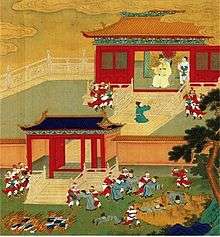
Killing the Scholars and Burning the Books in 210–213 BC (18th-century Chinese painting)
Book burning is the ritual destruction by fire of books or other written materials, usually carried out in a public context. The burning of books represents an element of censorship and usually proceeds from a cultural, religious, or political opposition to the materials in question.
Quotes
- There is more than one way to burn a book. And the world is full of people running about with lit matches. Every minority, be it Baptist/Unitarian, Irish/Italian/Octogenarian/Zen Buddhist, Zionist/Seventh-day Adventist, Women's Lib/Republican, Mattachine/FourSquareGospel feels it has the will, the right, the duty to douse the kerosene, light the fuse. Every dimwit editor who sees himself as the source of all dreary blanc-mange plain porridge unleavened literature, licks his guillotine and eyes the neck of any author who dares to speak above a whisper or write above a nursery rhyme.
- Ray Bradbury, Afterword to the 1979 edition of Fahrenheit 451
- "Do you ever read any of the books you burn?"
He laughed. "That's against the law!"
"Oh. Of course."- Ray Bradbury, Fahrenheit 451, p.8
- Books won't stay banned. They won't burn. Ideas won't go to jail. In the long run of history, the censor and the inquisitor have always lost. The only sure weapon against bad ideas is better ideas.
- Alfred Whitney Griswold, Essays on Education as quoted in The New York Times (24 February 1959).
- Dort, wo man Bücher verbrennt, verbrennt man am Ende auch Menschen.
- Where one begins by burning books, one will end up burning people.
- Heinrich Heine, Almansor.
- Where one begins by burning books, one will end up burning people.
- Sikander burnt all books the same wise as fire burns hay. All the scintillating works faced destruction in the same manner that lotus flowers face with the onset of frosty winter.
- About Sikandar Butshikan. Srivara, Zaina Rajtarangini.
- "I never taught of book burning, no matter how they were silly, mendacious or propaganda-like because I guide myself by the principle that every book burning was just an introduction to burning (of people) at the stake."
- Ivica Šola Quoted in column "O Bleiburgu i Titu očito može i bez fusnota: pa nećemo se valjda zamarati tamo nekim izvorima" in Slobodna Dalmacija, 4th April 2019.
External links
This article is issued from
Wikiquote.
The text is licensed under Creative
Commons - Attribution - Sharealike.
Additional terms may apply for the media files.